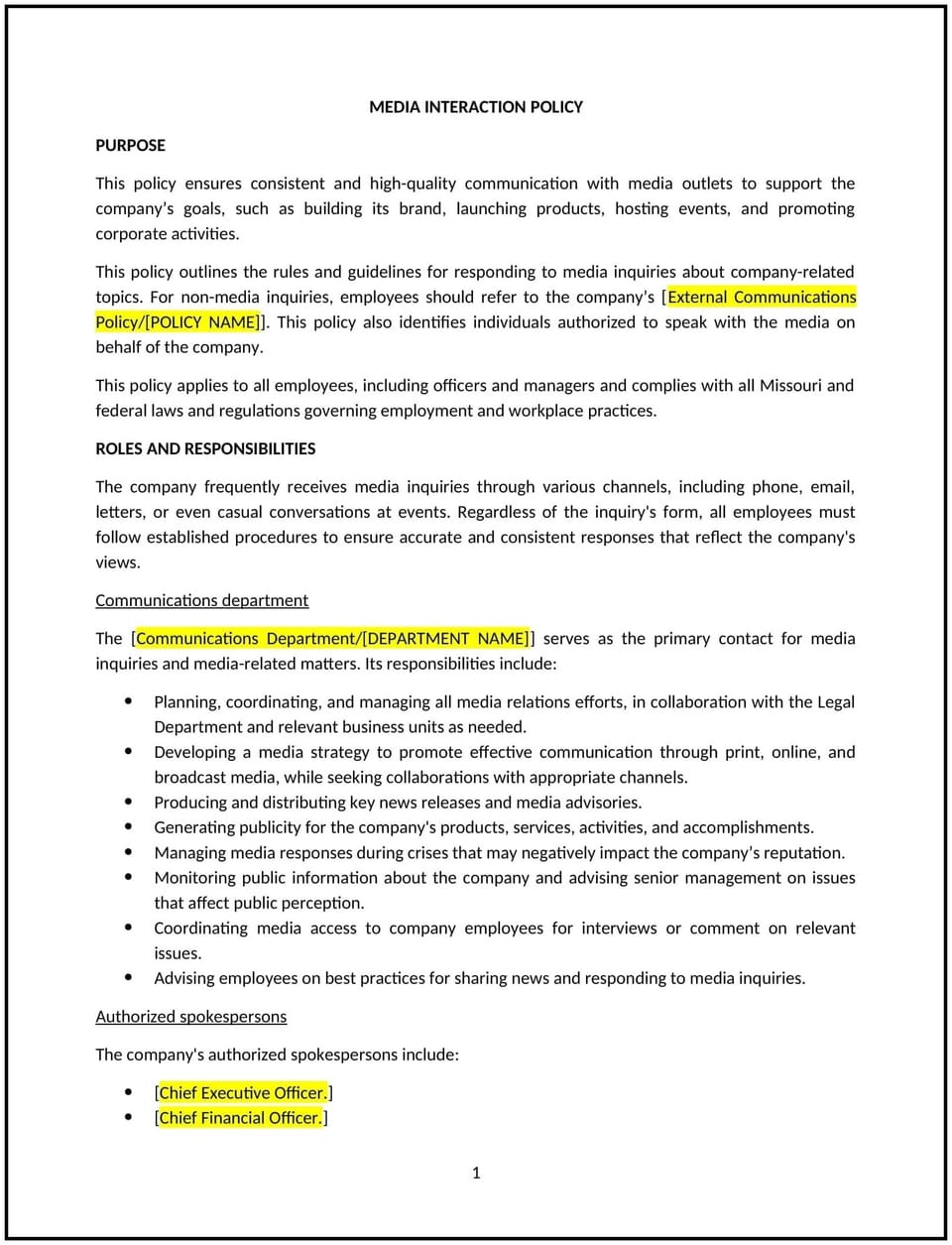Media relations policy (Missouri): Free template

Media relations policy (Missouri)
A media relations policy helps businesses in Missouri manage their interactions with the press, media outlets, and public relations activities. This policy outlines the guidelines for how employees should communicate with the media, who is authorized to speak on behalf of the company, and how to handle media inquiries. It aims to ensure that all media communications are aligned with company values, reflect the business's goals, and are consistent with the company’s public image.
By adopting this policy, businesses can maintain control over their messaging, ensure consistent communication, and protect the company's reputation when engaging with the media.
How to use this media relations policy (Missouri)
- Define spokespersons: Specify which employees or executives are authorized to speak to the media, typically senior management, communications officers, or public relations personnel.
- Set media communication guidelines: Outline the key principles for interacting with the media, including the need for consistent, clear, and professional messaging that reflects the company's goals, values, and legal requirements.
- Establish procedures for responding to media inquiries: Define how media inquiries should be handled, including who should be contacted, how responses should be prepared, and the timeline for providing information.
- Protect company confidentiality: Emphasize the importance of protecting sensitive company information and confidential data when engaging with the media, and set clear boundaries on what can and cannot be shared.
- Provide training and resources: Offer training to employees on how to handle media interactions, including how to avoid common pitfalls, stay on message, and protect the company’s interests when speaking to reporters.
- Crisis communication procedures: Establish protocols for handling negative press or crisis situations, including designated spokespersons, predefined messages, and how to manage media attention during challenging times.
- Review regularly: Periodically review the policy to ensure it aligns with changes in business operations, industry standards, and evolving media trends.
Benefits of using this media relations policy (Missouri)
This policy provides several benefits for businesses in Missouri:
- Protects the company’s image: A clear media relations policy helps manage how the company is portrayed in the press, reducing the risk of miscommunication or negative press that could damage the company’s reputation.
- Ensures consistency: By setting clear guidelines for how employees communicate with the media, businesses can ensure that messaging remains consistent and aligned with the company’s values and objectives.
- Mitigates legal risks: A formal policy helps protect the company from legal risks by ensuring that sensitive or confidential information is not disclosed unintentionally during media interactions.
- Improves responsiveness: By having clear procedures in place, businesses can respond quickly and effectively to media inquiries, ensuring that the company’s perspective is represented promptly.
- Enhances stakeholder relationships: Effective media relations help build trust with customers, investors, and the public by ensuring that communications are transparent, honest, and consistent.
- Supports crisis management: A defined process for managing media inquiries during a crisis ensures that the company can respond calmly, confidently, and in a way that aligns with its values and objectives.
Tips for using this media relations policy (Missouri)
- Communicate the policy clearly: Ensure all employees are aware of the policy and understand the importance of managing media interactions, especially those in customer-facing or public relations roles.
- Identify key spokespersons: Designate specific individuals within the company who are authorized to speak with the media, and provide them with the necessary training and resources to handle media inquiries effectively.
- Be proactive: Take a proactive approach to media relations by regularly engaging with the media, sharing news and updates about the company, and building positive relationships with journalists and reporters.
- Handle media inquiries professionally: When responding to media inquiries, ensure that responses are clear, accurate, and aligned with company messaging. Avoid speculation or providing personal opinions.
- Prepare for crises: Develop a crisis communication plan that includes predetermined key messages, spokespersons, and procedures for handling media inquiries during emergencies or negative publicity.
- Review regularly: Periodically review and update the policy to ensure it reflects the current media landscape, any changes in business operations, and the latest best practices in media relations.
Q: Why should businesses in Missouri adopt a media relations policy?
A: Businesses should adopt this policy to manage media communications consistently, protect the company’s reputation, ensure accurate information is shared, and align all public messages with the company’s values and goals.
Q: Who is authorized to speak to the media on behalf of the company?
A: Businesses should designate specific employees, typically senior management or public relations professionals, who are authorized to speak with the media. These individuals should be trained in handling media inquiries and delivering consistent, clear messages.
Q: How should employees respond to media inquiries?
A: Employees should be instructed to direct any media inquiries to the designated spokesperson or public relations officer, who will handle the response according to company guidelines and pre-approved messaging.
Q: How can businesses ensure their messaging remains consistent across media interactions?
A: Businesses should create clear communication guidelines, provide training for spokespersons, and develop key messaging documents that ensure all media interactions align with the company’s values, goals, and public image.
Q: What should employees do if they receive negative media coverage about the company?
A: Businesses should have a crisis communication plan in place, including protocols for addressing negative media coverage. The designated spokesperson should be prepared to respond quickly with a calm, transparent, and consistent message.
Q: How often should businesses review their media relations policy?
A: Businesses should review the policy regularly, at least annually, to ensure it remains up-to-date with changes in the company’s media strategy, evolving legal requirements, and best practices in public relations.
This article contains general legal information and does not contain legal advice. Cobrief is not a law firm or a substitute for an attorney or law firm. The law is complex and changes often. For legal advice, please ask a lawyer.


